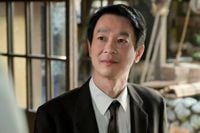On March 31, 2025, NHK's continuous TV novel "Anpan" began broadcasting, captivating audiences with its unique storytelling. The drama boldly reconstructs the lives of Takashi Yanase and his wife, Hure Komatsu, the creators behind the beloved character Anpanman. This series portrays a turbulent journey of two individuals who, despite facing numerous challenges, never forgot their dreams, ultimately leading to the creation of Anpanman. It is a heartwarming tale filled with love and courage, inspiring viewers to appreciate the joy of living.
The roles of the husband and wife are portrayed by Takumi Kitamura and Moka Kamishiraishi, respectively. As the 112th installment of NHK's morning dramas, "Anpan" is not just a retelling of a life story but a narrative that embodies the essence of perseverance and justice. The script, crafted by Miho Nakae, aims to resonate with audiences by highlighting the couple's journey from obscurity to becoming cultural icons.
In a recent interview, Ryo Katsuji, who plays the character Sotaro Asada, the father of the main character Nobu Asada, expressed his excitement about being part of the project. "I've liked Mr. Yanase since a long time ago," he shared, reflecting on his admiration for the creator of Anpanman. Katsuji described his character as a progressive and gentle father, who encourages his daughters to pursue their dreams without hesitation. He recalled how Yanase’s war experiences and kind nature left a lasting impression on him, further deepening his appreciation for the legendary figure.
"Anpan" is not just a drama about personal struggles but also delves into broader themes of justice and morality. The phrase “So it is, not just for everyone” from the iconic "Anpanman's March" encapsulates Yanase's philosophy that one's existence is meant to serve others. This message of selflessness and community is a cornerstone of the Anpanman legacy, which has made it a cherished part of Japanese culture.
As the show progresses, viewers are eager to see how these themes will unfold. Katsuji emphasized the importance of the script's message, hoping it would resonate with audiences: "I wish for this work to portray what unchanging justice means." His comments reflect a deep understanding of the story's essence and its potential impact on viewers.
In addition to the drama, the article introduces two significant works related to Takashi Yanase. The first is a definitive biography titled "Takashi Yanase's Life: Anpanman and Me," penned by Miko Kaji. This biography is a thorough exploration of Yanase's life, filled with previously unknown anecdotes and insights into his character and creativity.
The second work, "A Man of Love: Takashi Yanase," is written by one of Yanase's beloved disciples. This book recounts Yanase's life through his poetry and contributions to children's literature, showcasing the love and dedication he had for nurturing talent in others. It serves as a testament to his enduring influence on the world of art and literature.
As the series continues to air, many are reflecting on the cultural significance of Anpanman. The anime "Soreike! Anpanman," based on Yanase's picture book, has become a staple of children's entertainment in Japan. Anpanman is depicted as a fearless hero who helps those in need, embodying ideals of justice without resorting to unnecessary violence. His self-sacrificial nature, such as giving parts of his face to those who are hungry, resonates deeply with children and parents alike.
Moreover, the show features a colorful cast of characters, including Currypanman and Shokupanman, who join Anpanman in his adventures. Each character brings a unique flavor to the narrative, reinforcing themes of friendship and community. The introduction of local characters like Masuzushiman, inspired by Toyama's specialty dish, further enriches the storyline and connects with regional audiences.
April 4th is recognized as "Anpan Day," celebrating the legacy of this beloved character and the values he represents. The day serves as a reminder of Yanase's impact on Japanese culture and the joy he has brought to countless children through his stories.
However, not all discussions surrounding Yanase's work have been positive. Recently, there has been an examination of the ideological differences between Yanase and contemporary artists like Yojiro Noda of the band RADWIMPS. Noda's lyrics and public statements have sparked controversy, raising questions about their compatibility with the themes of Anpanman.
The contrasting philosophies highlight a significant divide in how each artist perceives the world and their role within it. While Yanase's work emphasizes unity and altruism, Noda's lyrics often reflect a more individualistic and critical perspective on society. This divergence raises intriguing questions about the direction of the series and how it will incorporate these themes into its narrative.
As viewers await the next episodes, they are left to ponder the implications of these artistic choices. Will the themes of justice and community prevail in the storytelling, or will the series explore the complexities of modern life that Noda's music encapsulates? Only time will tell.
Overall, "Anpan" promises to be more than just a nostalgic look back at the creators of Anpanman; it aims to inspire a new generation to reflect on the values of kindness and courage. With its heartfelt narrative and strong performances, the series is set to become a significant part of Japan's cultural landscape, just as Anpanman has been for decades.







